Schmitt C.B. (ed.) The Cambridge History of Renaissance Philosophy
Подождите немного. Документ загружается.

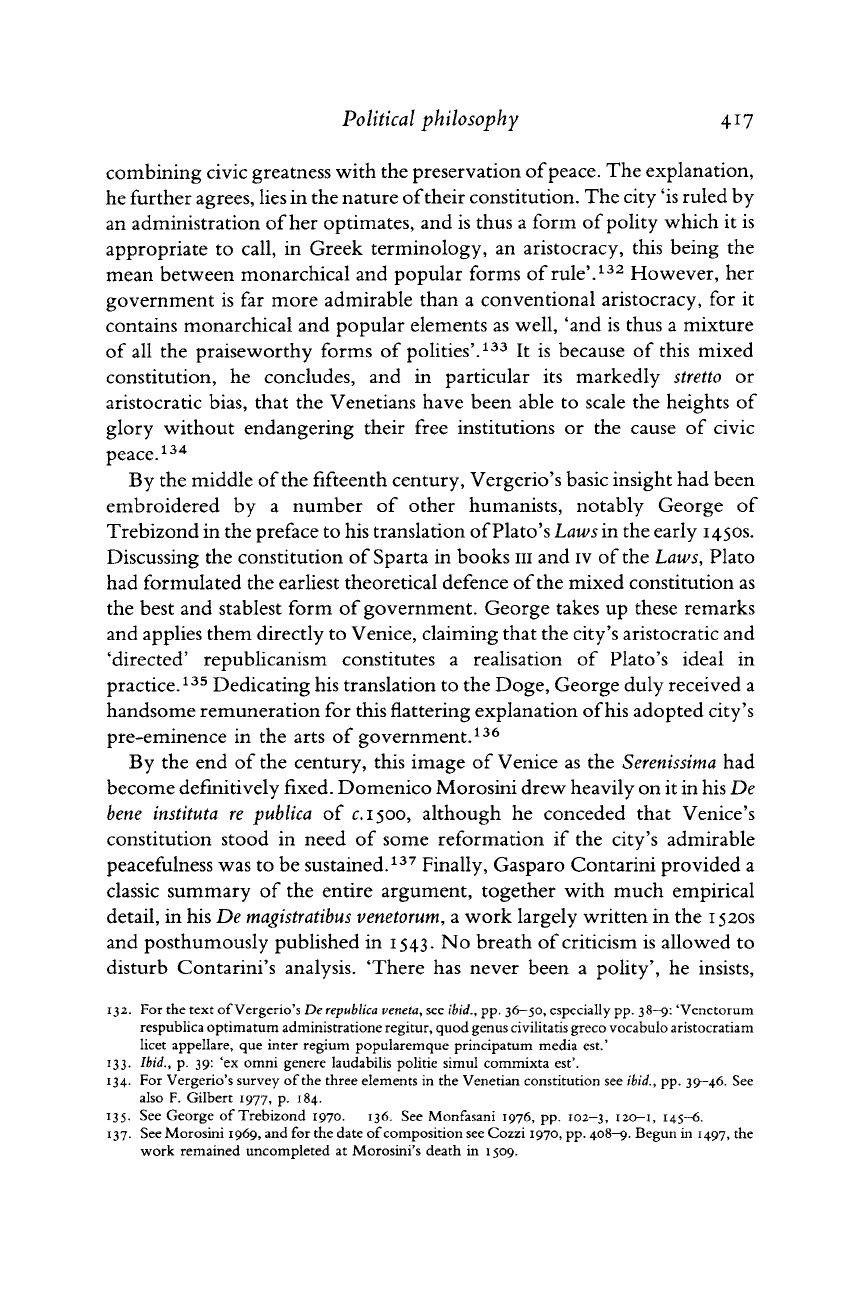
Political
philosophy
417
combining civic greatness with the preservation
of
peace.
The explanation,
he further agrees,
lies
in the
nature
of
their
constitution. The city 'is ruled by
an
administration of
her
optimates, and is thus a form of polity which it is
appropriate
to call, in Greek terminology, an aristocracy, this
being
the
mean between monarchical and popular forms of rule'.
132
However, her
government is far more admirable than a conventional
aristocracy,
for it
contains monarchical and popular elements as
well,
'and is thus a mixture
of
all the praiseworthy forms of polities'.
133
It is because of this mixed
constitution, he concludes, and in particular its markedly stretto or
aristocratic
bias, that the Venetians have been able to scale the heights of
glory without endangering their free institutions or the cause of civic
peace.
134
By
the middle
of
the fifteenth century, Vergerio's basic insight had been
embroidered by a number of other humanists, notably George of
Trebizond in the preface to his translation
of
Plato's
Laws
in the early
1450s.
Discussing
the constitution of
Sparta
in books m and iv of the
Laws,
Plato
had formulated the earliest theoretical defence of the mixed constitution as
the best and stablest form of government. George takes up these remarks
and applies them directly to Venice, claiming that the city's
aristocratic
and
'directed'
republicanism constitutes a realisation of Plato's ideal in
practice.
135
Dedicating his translation to the Doge, George duly received a
handsome remuneration for this flattering explanation
of
his adopted city's
pre-eminence in the
arts
of government.
136
By
the end of the century, this image of Venice as the
Serenissima
had
become definitively fixed. Domenico Morosini drew heavily on it in his De
bene
instituta re
publica
of
c.1500,
although he conceded that Venice's
constitution stood in need of some reformation if the city's admirable
peacefulness was to be sustained.
137
Finally, Gasparo Contarini provided a
classic summary of the entire argument, together with much empirical
detail, in his De
magistratibus
venetorum, a work largely written in the
1520s
and posthumously published in
1543.
No breath of criticism is allowed to
disturb Contarini's analysis. 'There has never been a polity', he insists,
132.
For the
text
of
Vergerio's
De república véneta, see ibid., pp.
36-50,
especially
pp. 38-9:
'Venetorum
respublica optimatum
administratione
regitur,
quod
genus
civilitatis
greco
vocabulo
aristocratiam
licet
appellare,
que
inter
regium
popularemque
principatum
media
est.'
133.
Ibid., p. 39: 'ex
omni
genere
laudabilis
politie
simul
commixta
est'.
134. For
Vergerio's
survey
of the
three
elements
in the
Venetian
constitution
see ibid., pp.
39-46.
See
also
F. Gilbert 1977, p. 184.
135.
See George of Trebizond 1970. 136. See Monfasani 1976, pp. 102-3, 120-1, 145-6.
137.
See
Morosini
1969, and for the
date
of
composition
see Cozzi 1970, pp.
408-9.
Begun
in 1497, the
work
remained
uncompleted
at
Morosini's
death
in 1509.
Cambridge Histories Online © Cambridge University Press, 2008
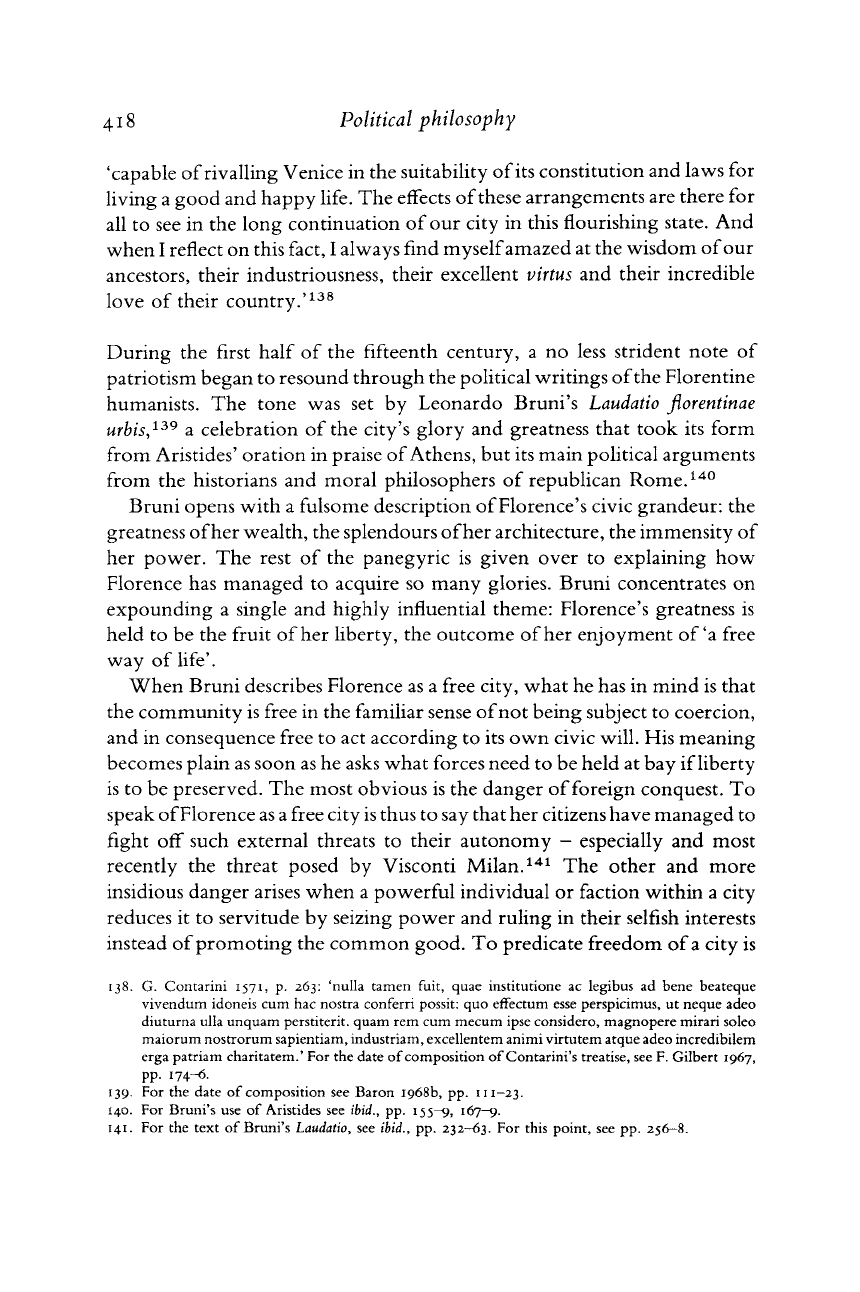
4i8
Political
philosophy
'capable
of
rivalling Venice in the suitability
of
its constitution and laws for
living
a good and happy
life.
The effects
of
these
arrangements
are there for
all to see in the
long
continuation of our city in this flourishing state. And
when
I
reflect on this fact, I always
find
myself amazed at the wisdom
of
our
ancestors,
their industriousness, their excellent virtus and their incredible
love of their country.'
138
During the first half of the fifteenth century, a no
less
strident note of
patriotism
began to resound through the political writings
of
the Florentine
humanists. The tone was set by Leonardo Bruni's
Laudatio jlorentinae
urbis,
139
a celebration of the city's glory and greatness that took its form
from
Aristides' oration in praise
of
Athens, but its main political arguments
from
the historians and moral philosophers of republican Rome.
140
Bruni
opens with a fulsome description
of
Florence's
civic
grandeur:
the
greatness
of
her
wealth, the splendours
of
her
architecture,
the immensity of
her
power. The rest of the panegyric is given over to explaining how
Florence
has managed to acquire so many glories. Bruni concentrates on
expounding a
single
and highly influential theme: Florence's greatness is
held to be the fruit of
her
liberty, the outcome
of
her
enjoyment of'a free
way of
life'.
When Bruni describes Florence as a free city, what he has in mind is that
the community is free in the familiar sense
of
not
being
subject to coercion,
and in consequence free to act according to its own civic
will.
His meaning
becomes plain as soon as he asks what forces need to be held at bay
if
liberty
is to be preserved. The most obvious is the danger
of
foreign conquest. To
speak
of
Florence
as
a
free city is thus to say
that
her citizens have managed to
fight off such external threats to their autonomy
—
especially and most
recently
the threat posed by Visconti Milan.
141
The other and more
insidious
danger arises when a powerful individual or faction within a city
reduces
it to servitude by
seizing
power and ruling in their
selfish
interests
instead of promoting the common good. To predicate freedom
of
a
city is
138. G. Contarini 1571, p. 263:
'nulla
tamen
fuit,
quae
institutione
ac
legibus
ad
bene
beateque
vivendum
idoneis
cum hac
nostra
conferri
possit:
quo
effectum
esse
perspicimus,
ut
neque
adeo
diuturna
ulla
unquam
perstiterit.
quam
rem cum
mecum
ipse
considero,
magnopere
mirari
soleo
maiorum
nostrorum
sapientiam,
industriam,
excellentem
animi
virtutem
atque
adeo
incredibilem
erga patriam
charitatem.'
For the
date
of
composition
of
Contarini's
treatise,
see F. Gilbert 1967,
pp. 174-6.
139. For the
date
of
composition
see
Baron
1968b,
pp.
111-23.
140. For
Bruni's
use of
Aristides
see ibid., pp. 155-9, 167—9.
141.
For the
text
of
Bruni's
Laudatio, see ibid., pp.
232-63.
For
this
point,
see pp.
256—8.
Cambridge Histories Online © Cambridge University Press, 2008
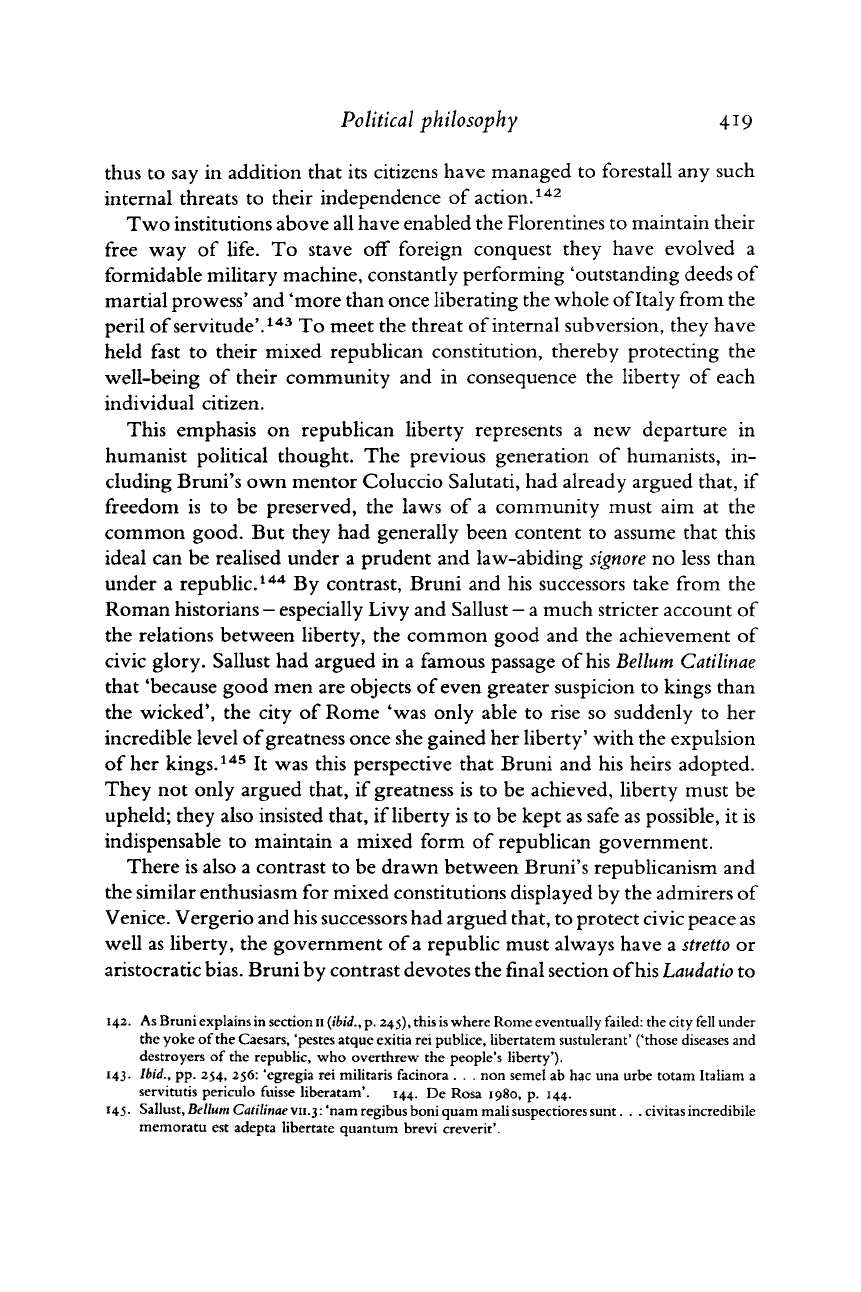
Political
philosophy
419
thus to say in addition that its citizens have managed to forestall any such
internal
threats to their independence of action.
142
Two institutions above all have enabled the Florentines to maintain their
free
way of
life.
To stave off foreign conquest they have evolved a
formidable military machine, constantly performing 'outstanding deeds of
martial
prowess' and 'more than once liberating the whole
of
Italy
from the
peril
of
servitude'.
143
To meet the threat of
internal
subversion, they have
held fast to their mixed republican constitution, thereby protecting the
well-being
of their community and in consequence the liberty of each
individual citizen.
This emphasis on republican liberty represents a new departure in
humanist political thought. The previous generation of humanists, in-
cluding Bruni's own mentor Coluccio Salutati, had already argued that, if
freedom is to be preserved, the laws of a community must aim at the
common good. But they had generally been content to assume that this
ideal can be realised under a prudent and law-abiding
signore
no
less
than
under
a republic.
144
By contrast, Bruni and his successors take from the
Roman
historians - especially Livy and Sallust - a much
stricter
account of
the relations between liberty, the common good and the achievement of
civic glory. Sallust had argued in a famous passage of his Bellum
Catilinae
that
'because good men are objects of even greater suspicion to kings than
the wicked', the city of Rome 'was only able to rise so suddenly to her
incredible
level
of
greatness once she gained her liberty' with the expulsion
of
her kings.
145
It was this perspective that Bruni and his heirs adopted.
They not only argued that, if greatness is to be achieved, liberty must be
upheld; they also insisted that,
if
liberty is to be kept as safe as possible, it is
indispensable to maintain a mixed form of republican government.
There
is also a contrast to be drawn between Bruni's republicanism and
the similar enthusiasm for mixed constitutions displayed by the
admirers
of
Venice. Vergerio and his successors had argued
that,
to protect civic peace as
well
as liberty, the government of
a
republic must always have a stretto or
aristocratic
bias. Bruni by
contrast
devotes the final section
of
his
Laudatio
to
142. As Bruni
explains
in
section
11
(ibid., p. 245),
this
is
where
Rome
eventually
failed:
the
city
fell
under
the
yoke
of the Caesars,
'pestes
atque
exitia
rei
publice,
libertatem
sustulerant'
('those
diseases
and
destroyers
of the
republic,
who
overthrew
the
people's
liberty'),
143. Ibid., pp. 254, 256:
'egregia
rei
militaris
facinora
. . . non
semel
ab hac una
urbe
totam
Italiam
a
servitutis
periculo
fuisse
liberatam'.
144. De
Rosa
1980, p. 144.
145.
Sallust,
Bellum Catilinae vn.y. 'nam
regibus
boni
quam
mali
suspectiores
sunt.
. .
civitas
incredibile
memoratu
est
adepta
libertate
quantum
brevi
creverit'.
Cambridge Histories Online © Cambridge University Press, 2008
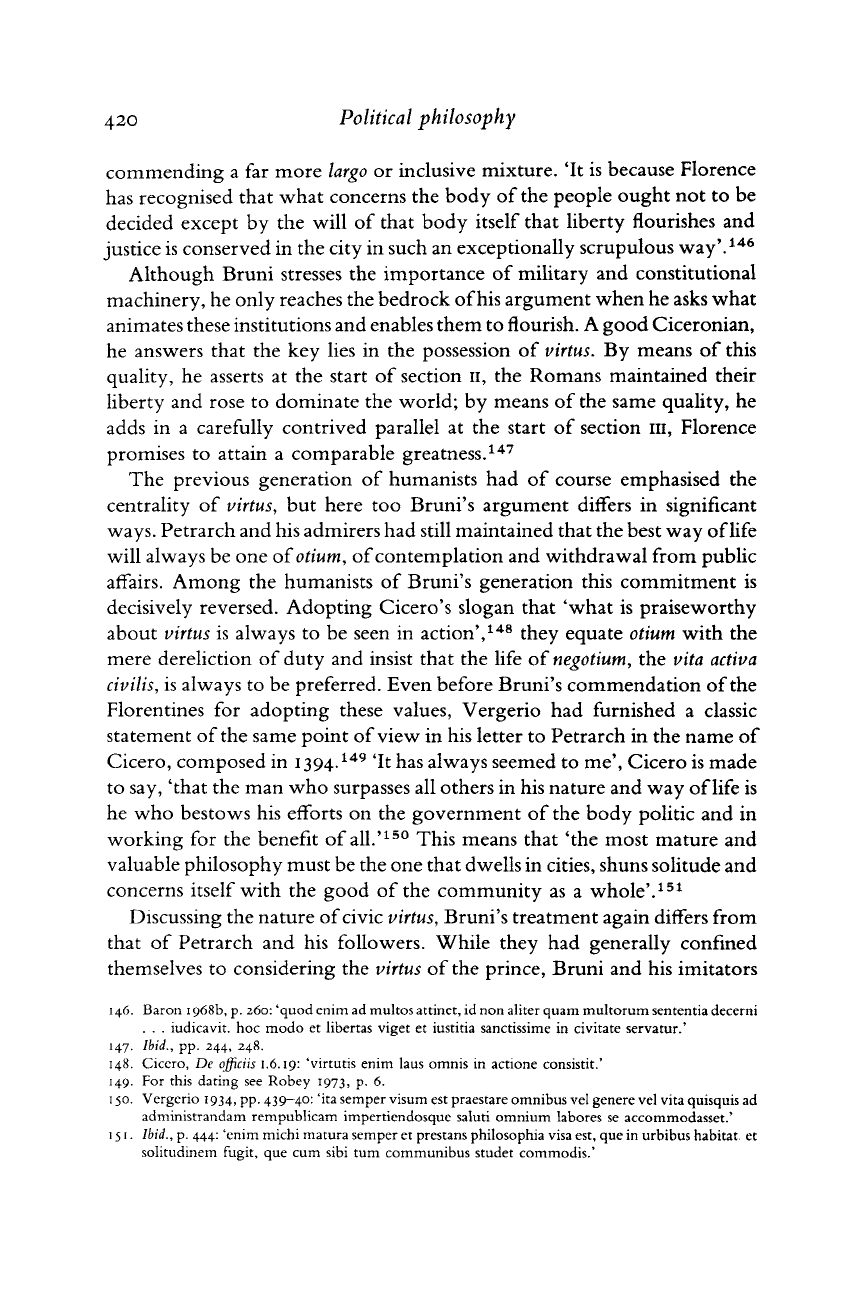
420
Political
philosophy
commending a far more
largo
or inclusive mixture. 'It is because Florence
has recognised that what concerns the body of the people ought not to be
decided except by the
will
of that body itself that liberty flourishes and
justice is conserved in the city in such an exceptionally scrupulous way'.
146
Although Bruni stresses the importance of military and constitutional
machinery,
he only reaches the bedrock
of
his argument when he asks what
animates these institutions and enables them to flourish. A good Ciceronian,
he answers that the key
lies
in the
possession
of virtus. By means of this
quality, he asserts at the
start
of section n, the Romans maintained their
liberty and rose to dominate the world; by means of the same quality, he
adds in a carefully contrived parallel at the
start
of section m, Florence
promises to attain a comparable greatness.
147
The
previous generation of humanists had of course emphasised the
centrality
of virtus, but here too Bruni's argument differs in significant
ways.
Petrarch
and his
admirers
had
still
maintained that the best way
of
life
will
always be one
of
otium,
of
contemplation and withdrawal from public
affairs.
Among the humanists of Bruni's generation this commitment is
decisively reversed. Adopting Cicero's slogan that 'what is praiseworthy
about virtus is always to be
seen
in action',
148
they equate otium with the
mere
dereliction of duty and insist that the
life
of negotium, the vita
activa
civilis,
is always to be preferred. Even before Bruni's commendation
of
the
Florentines for adopting these values, Vergerio had furnished a classic
statement of the same point of
view
in his letter to
Petrarch
in the name of
Cicero,
composed in
1394.
149
'It has always seemed to me', Cicero is made
to
say, 'that the man who surpasses all others in his nature and way
of
life
is
he who bestows his efforts on the government of the body politic and in
working for the benefit of all.'
150
This means that 'the most mature and
valuable philosophy must be the one that
dwells
in cities, shuns solitude and
concerns
itself with the good of the community as a whole'.
151
Discussing the nature
of
civic virtus, Bruni's treatment again differs from
that
of
Petrarch
and his followers. While they had generally confined
themselves to considering the virtus of the prince, Bruni and his imitators
146.
Baron
1968b,
p. 260:
'quod
enim
ad
multos
attinet,
id non
aliter
quam
multorum
sententia
decerni
.
. .
iudicavit.
hoc
modo
et
libertas
viget
et
iustitia
sanctissime
in
civitate
servatur.'
147.
Ibid., pp. 244, 248.
148. Cicero, De officiis 1.6.19:
'virtutis
enim
laus
omnis
in
actione
consistit.'
149. For
this
dating
see Robey 1973, p. 6.
150.
Vergerio
1934, pp.
439-40:
'ita
semper
visum
est
praestare
omnibus
vel
genere
vel vita
quisquis
ad
administrandam
rempublicam
impertiendosque
saluti
omnium
labores
se
accommodasset.'
151.
Ibid., p. 444:
'enim
michi
matura
semper
et
prestans
philosophia
visa
est, que in
urbibus
habitat,
et
solitudinem
fugit, que cum
sibi
turn
communibus
studet
commodis.'
Cambridge Histories Online © Cambridge University Press, 2008
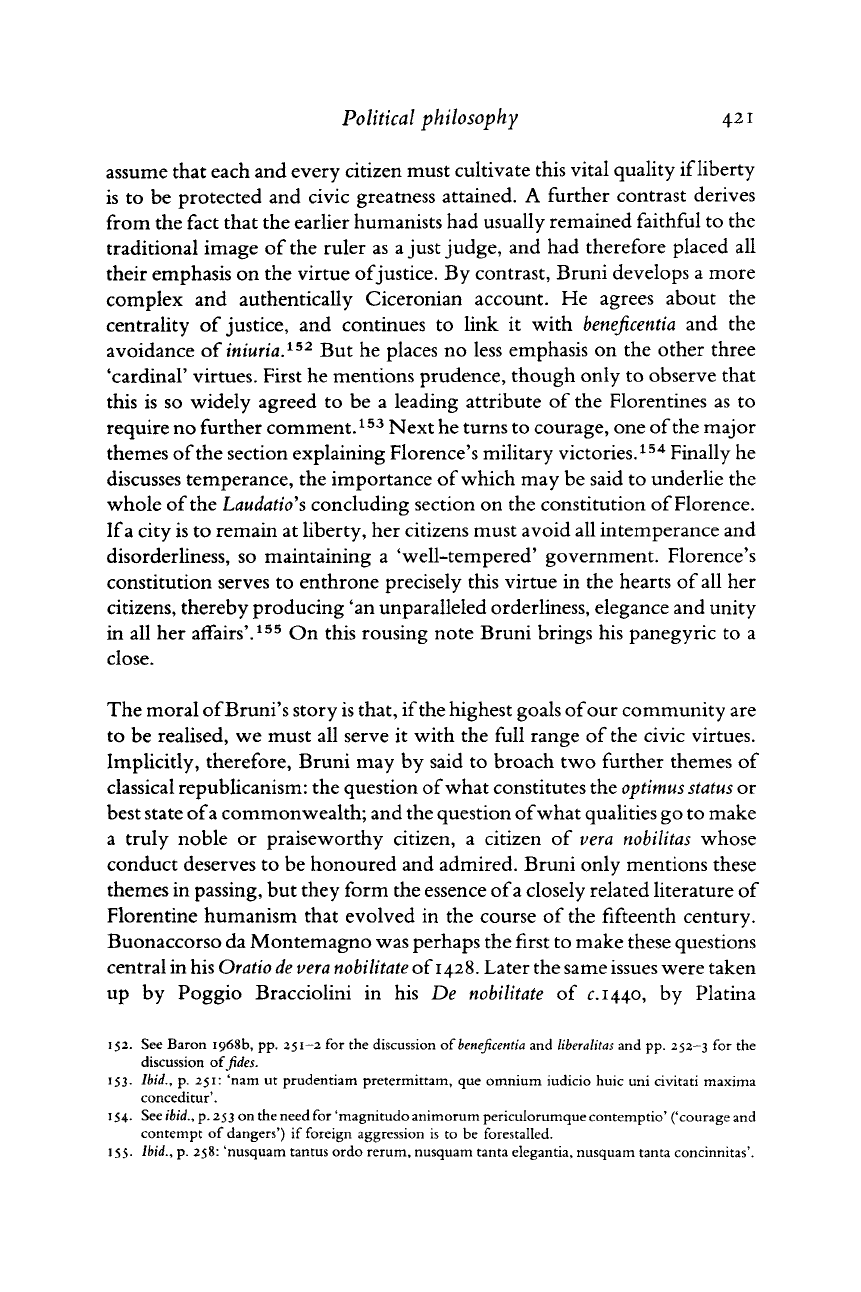
Political
philosophy
421
assume that each and every citizen must cultivate this vital quality
if
liberty
is to be protected and civic greatness attained. A further contrast derives
from
the fact that the earlier humanists had usually remained faithful to the
traditional
image of the ruler as
a
just judge, and had therefore placed all
their
emphasis on the virtue
of
justice.
By contrast, Bruni develops a more
complex and authentically Ciceronian account. He agrees about the
centrality
of justice, and continues to link it with
beneficentia
and the
avoidance of
iniuria.
152
But he places no
less
emphasis on the other three
'cardinal'
virtues.
First
he mentions prudence, though only to observe that
this is so
widely
agreed to be a leading attribute of the Florentines as to
require
no further comment.
153
Next he turns to courage, one
of
the major
themes
of
the section explaining Florence's military victories.
154
Finally he
discusses temperance, the importance
of
which may be said to underlie the
whole
of
the
Laudations
concluding section on the constitution of
Florence.
If
a
city is to remain at liberty, her citizens must avoid all intemperance and
disorderliness, so maintaining a 'well-tempered' government. Florence's
constitution serves to enthrone precisely this virtue in the hearts of all her
citizens, thereby producing 'an unparalleled orderliness, elegance and unity
in all her affairs'.
155
On this rousing note Bruni brings his panegyric to a
close.
The
moral
of Brum's
story is that,
if
the highest goals
of
our
community are
to
be realised, we must all serve it with the
full
range of the civic virtues.
Implicitly, therefore, Bruni may by said to broach two further themes of
classical republicanism: the question
of
what constitutes the optimus status or
best
state
of
a
commonwealth; and the question
of
what qualities go to make
a
truly noble or praiseworthy citizen, a citizen of
vera
nobilitas
whose
conduct deserves to be honoured and admired. Bruni only mentions these
themes in passing, but they form the essence
of
a
closely related
literature
of
Florentine
humanism that evolved in the course of the fifteenth century.
Buonaccorso
da Montemagno was perhaps the first to make these questions
central
in his
Oratio
de
vera
nobilitate
of
1428.
Later
the same
issues
were taken
up by Poggio Bracciolini in his De
nobilitate
of
c.1440,
by Platina
152.
See
Baron
1968b,
pp. 251-2 for the
discussion
of beneficentia and liberalitas and pp.
252-3
for the
discussion
of fides.
153.
Ibid., p. 251: 'nam ut
prudentiam
pretermittam,
que
omnium iudicio
huic
uni
civitati
maxima
conceditur'.
154. See ibid., p. 253 on the
need
for
'magnitudo
animorum
periculorumque
contemptio'
('courage
and
contempt
of
dangers')
if
foreign
aggression
is to be
forestalled.
155.
Ibid., p. 258:
'nusquam
tantus
ordo
rerum,
nusquam
tanta
elegantia,
nusquam
tanta
concinnitas'.
Cambridge Histories Online © Cambridge University Press, 2008
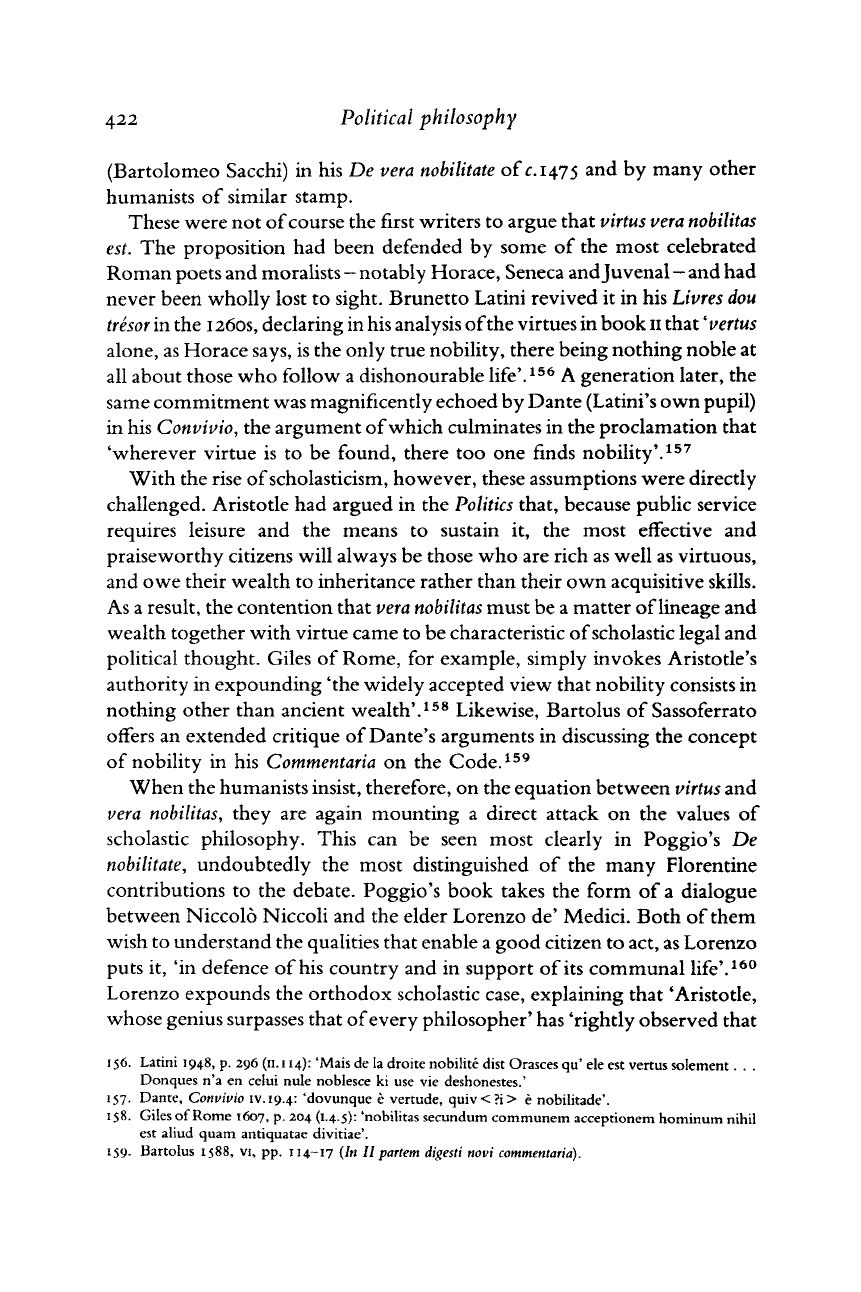
422
Political
philosophy
(Bartolomeo
Sacchi) in his De
vera
nobilitate
of
c.1475
and by many other
humanists of similar stamp.
These were not
of
course
the first writers to argue that virtus
vera
nobilitas
est.
The proposition had been defended by some of the most celebrated
Roman
poets and
moralists
- notably
Horace,
Seneca
and
Juvenal—and
had
never
been wholly lost to sight. Brunetto Latini revived it in his
Livres
dou
trésor
in the
1260s,
declaring in his analysis
of
the
virtues in book
11
that'
vertus
alone, as Horace says, is the only
true
nobility, there being nothing noble at
all about those who
follow
a dishonourable
life'.
156
A generation
later,
the
same
commitment was magnificently echoed by Dante
(Latini's
own pupil)
in his
Convivio,
the argument
of
which culminates in the proclamation that
'wherever
virtue is to be found, there too one finds nobility'.
157
With
the rise
of
scholasticism, however, these assumptions were directly
challenged. Aristotle had argued in the
Politics
that, because public service
requires
leisure and the means to sustain it, the most effective and
praiseworthy
citizens
will
always be those who are rich as
well
as virtuous,
and
owe their wealth to inheritance
rather
than their own acquisitive skills.
As a result, the contention that
vera
nobilitas
must be a
matter
of
lineage and
wealth together with virtue came to be
characteristic
of
scholastic
legal and
political thought. Giles of Rome, for example, simply invokes Aristotle's
authority
in expounding 'the
widely
accepted
view
that nobility consists in
nothing other than ancient wealth'.
158
Likewise, Bartolus of Sassoferrato
offers an extended critique of Dante's arguments in discussing the concept
of
nobility in his
Commentaria
on the Code.
159
When
the humanists insist, therefore, on the equation between virtus and
vera
nobilitas,
they are again mounting a direct
attack
on the values of
scholastic
philosophy. This can be seen most clearly in Poggio's De
nobilitate,
undoubtedly the most distinguished of the many Florentine
contributions to the debate. Poggio's book takes the form of a dialogue
between Niccoló Niccoli and the elder Lorenzo de' Medici. Both of them
wish
to understand the qualities that enable a good citizen to act, as Lorenzo
puts it, 'in defence of his country and in support of its communal
life'.
160
Lorenzo
expounds the orthodox scholastic case, explaining that 'Aristotle,
whose genius surpasses that
of
every
philosopher' has 'rightly observed that
156.
Latini 1948, p. 296
(11.114):
'Mais de la
droite
nobilité
dist
Orasces qu' ele est
vertus
solement.
. .
Donques
n'a en
celui
nule noblesce
ki use vie
deshonestes.'
157.
Dante, Convivio iv.19.4: 'dovunque é vertude, quiv<?i> é
nobilitade'.
158.
Giles of Rome 1607, p. 204 (1.4.5):
'nobilitas
secundum
communem
acceptionem
hominum
nihil
est
aliud
quam antiquatae divitiae'.
159.
Bartolus 1588, vi, pp.
114-17
(/" // partem digestí novi commentaria).
Cambridge Histories Online © Cambridge University Press, 2008
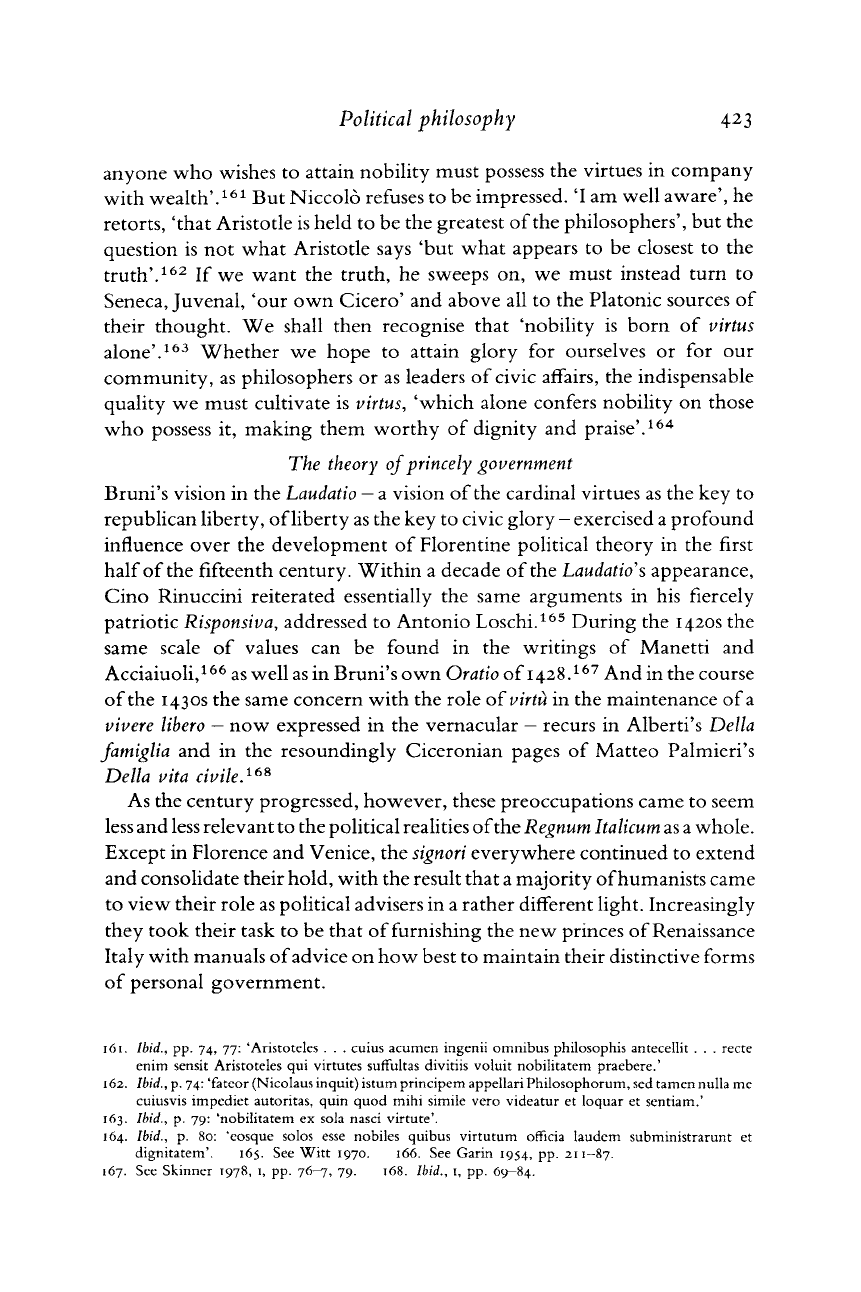
Political
philosophy
423
anyone who
wishes
to attain nobility must
possess
the virtues in company
with
wealth'.
161
But Niccolo refuses to be impressed. 'I am
well
aware', he
retorts,
'that Aristotle is
held
to be the greatest
of
the philosophers', but the
question is not what Aristotle says 'but what appears to be closest to the
truth'.
162
If we want the truth, he
sweeps
on, we must instead turn to
Seneca, Juvenal, 'our own Cicero' and above all to the Platonic sources of
their
thought. We shall then recognise that 'nobility is born of virtus
alone'.
163
Whether we hope to attain glory for ourselves or for our
community, as philosophers or as leaders of civic affairs, the indispensable
quality we must cultivate is virtus, 'which alone confers nobility on those
who
possess
it, making them worthy of dignity and praise'.
164
The theory
of
princely
government
Bruni's
vision
in the
Laudatio
—
a
vision
of the cardinal virtues as the key to
republican liberty,
of
liberty as the key to civic glory
—
exercised a profound
influence over the development of Florentine political theory in the first
half
of the fifteenth century. Within a decade of the
Laudatws
appearance,
Cino Rinuccini reiterated essentially the same arguments in his fiercely
patriotic
Risponsiva,
addressed to Antonio Loschi.
165
During the
1420s
the
same scale of values can be found in the writings of Manetti and
Acciaiuoli,
166
as
well
as in Bruni's own
Oratio
of
1428.
167
And in the course
of
the
143
os the same concern
with
the role of virtu in the maintenance
of
a
vivere
libero
- now expressed in the vernacular - recurs in Alberti's
Delia
famiglia
and in the resoundingly Ciceronian pages of Matteo Palmieri's
Delia
vita
civile.
169.
As the century progressed, however, these preoccupations came to seem
less
and
less
relevant to the political realities
of
the Regnum Italicum
as
a
whole.
Except
in Florence and Venice, the
signori
everywhere continued to extend
and consolidate their hold,
with
the result that
a
majority
of
humanists came
to
view
their role as political advisers in a
rather
different light. Increasingly
they took their task to be that
of
furnishing the new princes of Renaissance
Italy
with
manuals
of
advice on how best to maintain their distinctive forms
of
personal government.
161.
Ibid., pp. 74, 77:
'Aristoteles
. . .
cuius
acumen
ingenii
omnibus
philosophis
antecellit
. . .
recte
enim
sensit
Aristoteles
qui
virtutes
suffultas
divitiis
voluit
nobilitatem
praebere.'
162. Ibid., p. 74:
'fateor
(Nicolaus
inquit)
istum
principem
appellari
Philosophorum,
sed
tamen
nulla
me
cuiusvis
impediet
autoritas,
quin
quod
mihi
simile
vero
videatur
et
loquar
et
sentiam.'
163. Ibid., p. 79:
'nobilitatem
ex
sola
nasci
virtute'.
164. Ibid., p. 80:
'eosque
solos
esse
nobiles
quibus
virtutum
officia laudem
subministrarunt
et
dignitatem'.
165. See Witt 1970. 166. See Garin 1954, pp. 211-87.
167.
See
Skinner
1978, 1, pp. 76-7, 79. 168. Ibid., 1, pp.
69-84.
Cambridge Histories Online © Cambridge University Press, 2008
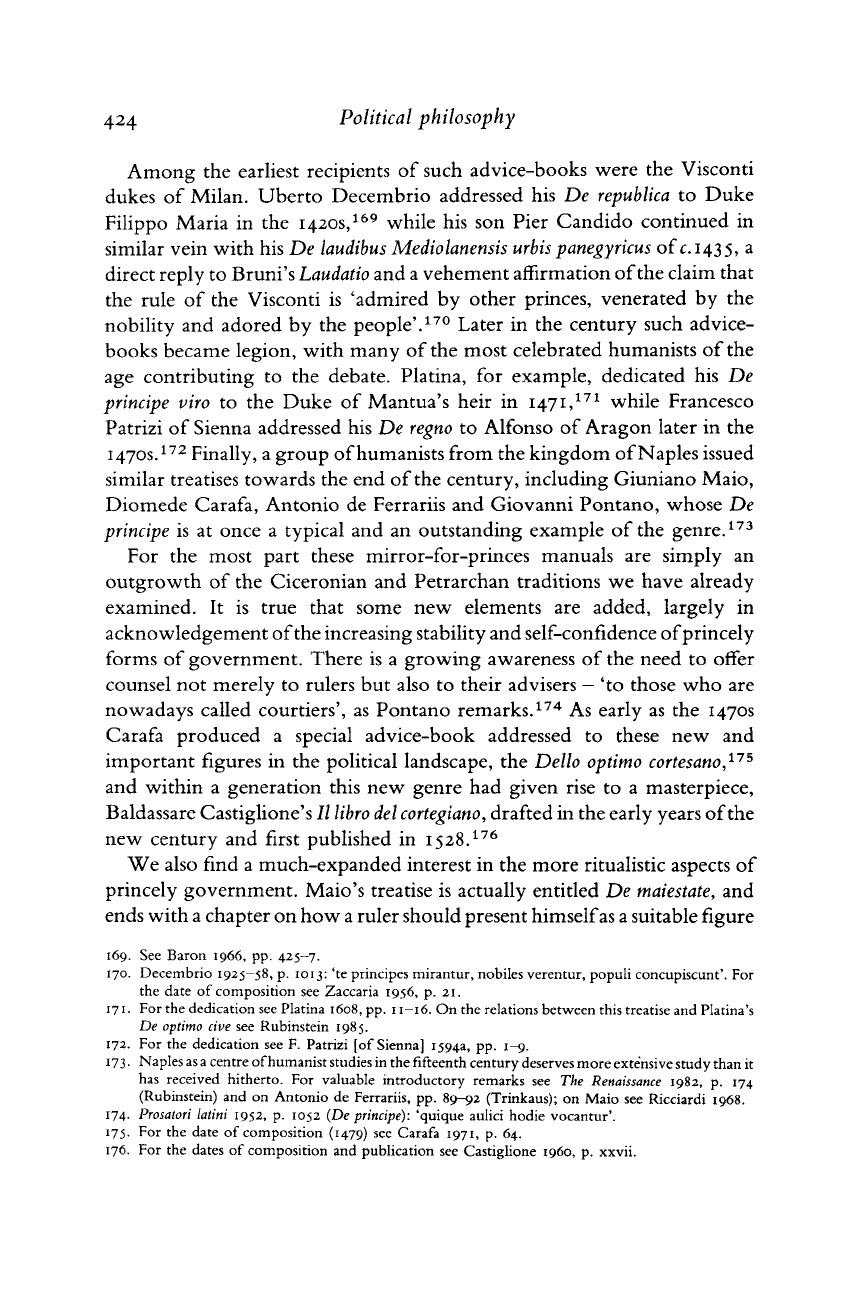
424
Political
philosophy
Among the earliest recipients of such advice-books were the Visconti
dukes of Milan. Uberto Decembrio addressed his De
republica
to Duke
Filippo Maria in the
1420s,
169
while
his son Pier Candido continued in
similar
vein
with
his De
laudibus
Mediolanensis
urbis
panegyricus
of
c.
1435,
a
direct
reply to Bruni's
Laudatio
and a vehement affirmation
of
the claim that
the rule of the Visconti is 'admired by other princes, venerated by the
nobility and adored by the people'.
170
Later
in the century such advice-
books became
legion,
with
many of the most celebrated humanists of the
age contributing to the debate. Platina, for example, dedicated his De
principe
viro
to the Duke of Mantua's heir in
1471,
171
while
Francesco
Patrizi
of Sienna addressed his De
regno
to
Alfonso
of Aragon later in the
1470s.
172
Finally, a group
of
humanists from the kingdom
of
Naples
issued
similar treatises towards the end of the century, including Giuniano Maio,
Diomede
Carafa,
Antonio de
Ferrariis
and Giovanni Pontano,
whose
De
principe
is at once a typical and an outstanding example of the genre.
173
For
the most
part
these mirror-for-princes manuals are simply an
outgrowth of the Ciceronian and
Petrarchan
traditions we have already
examined. It is true that some new elements are added, largely in
acknowledgement
of
the increasing stability and self-confidence
of
princely
forms of government. There is a growing awareness of the need to offer
counsel not merely to rulers but also to their advisers
—
'to those who are
nowadays called courtiers', as Pontano remarks.
174
As early as the
1470s
Carafa
produced a special advice-book addressed to these new and
important
figures in the political landscape, the
Dello
optimo
cortesano,
175
and
within
a generation this new genre had
given
rise to a masterpiece,
Baldassare
Castiglione's
libro
del
cortegiano,
drafted in the early years
of
the
new century and first
published
in
1528.
176
We
also
find
a much-expanded interest in the more ritualistic aspects of
princely government. Maio's treatise is actually entitled De
maiestate,
and
ends
with
a
chapter on how a ruler
should
present himself as
a
suitable figure
169. See
Baron
1966, pp.
425—7.
170.
Decembrio
1925-58, p. 1013: 'te
principes
mirantur,
nobiles
verentur,
populi
concupiscunt'.
For
the
date
of
composition
see Zaccaria 1956, p. 21.
171.
For the
dedication
see
Platina
1608, pp.
11-16.
On the
relations
between
this
treatise
and
Platina's
De
optimo cive see
Rubinstein
1985.
172.
For the
dedication
see F. Patrizi [of
Sienna]
1594a, pp. 1-9.
173.
Naples
as
a
centre
of
humanist
studies
in the
fifteenth
century
deserves
more
extensive
study
than
it
has
received
hitherto.
For
valuable
introductory
remarks
see The Renaissance 1982, p. 174
(Rubinstein)
and on
Antonio
de
Ferrariis,
pp.
89-92
(Trinkaus); on Maio see Ricciardi 1968.
174.
Prosatori latini 1952, p. 1052 (De principe):
'quique
aulici
hodie
vocantur'.
175.
For the
date
of
composition
(1479)
see Carafa 1971, p. 64.
176.
For the
dates
of
composition
and
publication
see
Castiglione
i960,
p. xxvii.
Cambridge Histories Online © Cambridge University Press, 2008
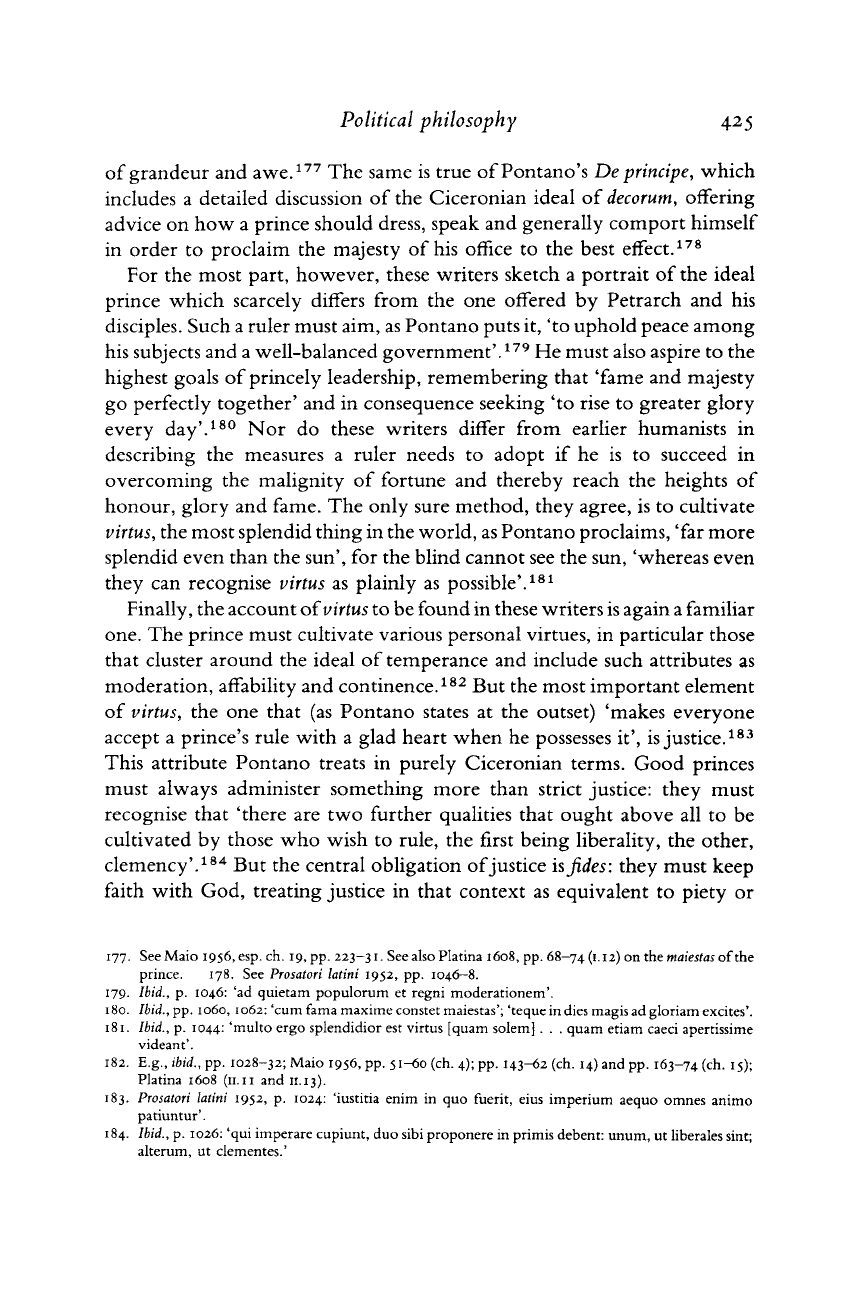
Political
philosophy
425
of
grandeur
and awe.
177
The same is true of Pontano's De
principe,
which
includes a detailed discussion of the Ciceronian ideal of
decorum,
offering
advice on how a prince should dress, speak and generally comport himself
in order to proclaim the majesty of his office to the best effect.
178
For
the most
part,
however, these writers sketch a portrait of the ideal
prince
which scarcely differs from the one offered by
Petrarch
and his
disciples. Such a ruler must aim, as Pontano puts it, 'to uphold peace among
his subjects and a well-balanced government'.
179
He must also aspire to the
highest goals of princely leadership, remembering that 'fame and majesty
go perfectly together' and in consequence
seeking
'to rise to greater glory
every day'.
180
Nor do these writers differ from earlier humanists in
describing the measures a ruler needs to adopt if he is to succeed in
overcoming the malignity of fortune and thereby reach the heights of
honour, glory and fame. The only sure method, they agree, is to cultivate
virtus,
the most
splendid
thing in the world, as Pontano proclaims, 'far more
splendid
even
than the sun', for the
blind
cannot see the sun, 'whereas
even
they can recognise virtus as plainly as possible'.
181
Finally, the account
of
virtus to be found in these writers is again
a
familiar
one. The prince must cultivate various personal virtues, in particular those
that
cluster around the ideal of temperance and include such attributes as
moderation, affability and continence.
182
But the most important element
of
virtus, the one that (as Pontano states at the outset) 'makes everyone
accept
a prince's rule
with
a glad heart
when
he
possesses
it', is justice.
183
This attribute Pontano treats in purely Ciceronian terms. Good princes
must always administer something more than strict justice: they must
recognise that 'there are two further qualities that ought above all to be
cultivated by those who
wish
to rule, the first
being
liberality, the other,
clemency'.
184
But the central obligation
of
justice is
fides:
they must keep
faith
with
God, treating justice in that context as equivalent to piety or
177.
See Maio 1956, esp. eh. 19, pp. 223-31. See
also
Platina
1608, pp.
68-74
(112) on the maiestas of the
prince.
178. See Prosatori latini 1952, pp.
1046—8.
179.
Ibid., p. 1046: 'ad
quietam populorum
et
regni
moderationem'.
180. Ibid., pp. 1060, 1062: 'cum
fama
maxime
constet
maiestas';
'teque
in
dies
magis
ad
gloriam
excites'.
181.
Ibid., p. 1044:
'multo
ergo
splendidior
est
virtus
[quam
solem]
. . .
quam
etiam
caeci
apertissime
videant'.
182. E.g., ibid., pp.
1028-32;
Maio 1956, pp. 51-60 (eh. 4); pp.
143-62
(eh. 14) and pp.
163-74
(eh. 15);
Platina
1608
(11.11
and
11.13).
183. Prosatori latini 1952, p. 1024:
'iustitia
enim
in quo
fuerit,
eius
imperium aequo
omnes
animo
patiuntur'.
184. Ibid., p. 1026: 'qui
imperare
cupiunt,
duo
sibi
proponere
in
primis
debent:
unum,
ut
liberales
sint;
alterum,
ut
clementes.'
Cambridge Histories Online © Cambridge University Press, 2008
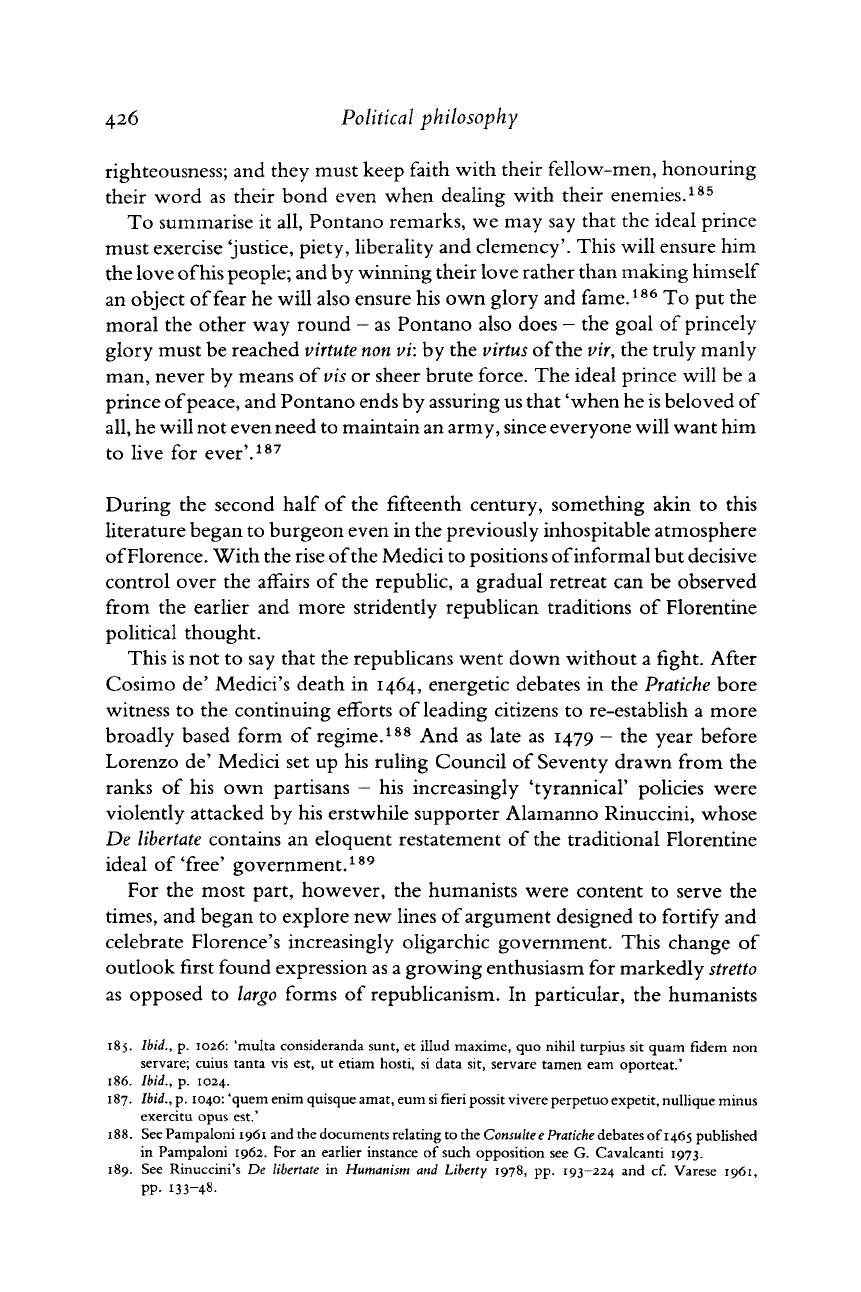
426
Political
philosophy
righteousness; and they must keep faith with their fellow-men, honouring
their
word as their bond even when dealing with their enemies.
185
To
summarise it all, Pontano remarks, we may say that the ideal prince
must exercise justice, piety, liberality and clemency'. This
will
ensure him
the love
of
his people; and by
winning
their love
rather
than making himself
an
object
of
fear
he
will
also ensure his own glory and fame.
186
To put the
moral
the other way round - as Pontano also does - the goal of princely
glory must be reached virtute non vi: by the virtus
of
the vir, the truly manly
man,
never by means of vis or sheer brute force. The ideal prince
will
be a
prince
of
peace,
and Pontano ends by assuring us that 'when he is beloved of
all, he
will
not even need to maintain an
army,
since everyone
will
want him
to
live
for ever'.
187
During the second half of the fifteenth century, something akin to this
literature
began to burgeon even in the previously inhospitable atmosphere
of
Florence.
With the rise
of
the Medici to positions
of
informal but decisive
control
over the affairs of the republic, a gradual
retreat
can be observed
from
the earlier and more stridently republican traditions of Florentine
political thought.
This is not to say that the republicans went down without a fight. After
Cosimo de' Medici's death in
1464,
energetic debates in the
Pratiche
bore
witness to the continuing efforts of leading citizens to re-establish a more
broadly
based form of regime.
188
And as late as
1479
- the year before
Lorenzo
de' Medici set up his rulifig Council of Seventy drawn from the
ranks
of his own partisans
—
his increasingly 'tyrannical' policies were
violently attacked by his erstwhile supporter Alamanno Rinuccini, whose
De
libertate
contains an eloquent restatement of the traditional Florentine
ideal of'free' government.
189
For
the most
part,
however, the humanists were content to serve the
times, and began to explore new
lines
of
argument
designed to fortify and
celebrate
Florence's increasingly oligarchic government. This change of
outlook first found expression as a growing enthusiasm for markedly stretto
as
opposed to
largo
forms of republicanism. In particular, the humanists
185. Ibid., p. 1026:
'multa
consideranda
sunt,
et
illud
maxime,
quo
nihil
turpius
sit
quam
fidem
non
servare;
cuius
tanta
vis est, ut
etiam
hosti,
si data sit,
servare
tamen
earn
oporteat.'
186. Ibid., p. 1024.
187. Ibid., p. 1040:
'quern
enim
quisque
amat,
eum si
fieri
possit
vivere
perpetuo
expetit,
nullique
minus
exercitu
opus
est.'
188. See
Pampaloni
1961 and the
documents
relating
to the Consulte e Pratiche
debates
of 1465
published
in
Pampaloni
1962. For an
earlier
instance
of
such
opposition
see G. Cavalcanti 1973.
189. See
Rinuccini's
De libertate in Humanism and Liberty 1978, pp.
193-224
and cf.
Varese
1961,
pp.
133-48.
Cambridge Histories Online © Cambridge University Press, 2008
